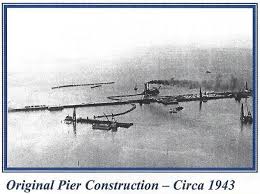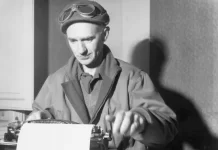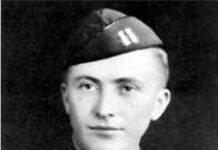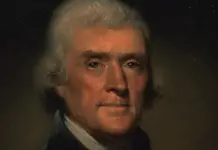Reading the news of the fights, drunken brawls and injuries during Spring Break among local college students today, it made me think of the teenagers in the Bayshore who lived through and very close to a war. Here are a few recollections from Middletown High School students a month after the war ended in Europe.
In 1945, four graduating students from Middletown High School each wrote about the military and the impact it had on everyone in the Bayshore. and had to read their essays at their graduation exercises. Dick Wacker spoke of the soldiers and sailors they knew who were in service. Virginia Trotter described the home-front efforts Middletown offered as part of the war effort. John Nelson highlighted the parts played by “the project which is peculiarly our own…the Navy and army ammunition-loading pier at Leonardo.” He also highlighted the ramifications of the base at Earle, with its headquarters 12 to 15 miles southwest of Leonardo.
That all preceded Nancy R. Meeker writing and speaking about Earle’s pier in Leonardo. In presenting her talk, the very articulate graduate reminded her audience that “this project is peculiarly our own. How else could I speak of it, when the pier, the very lifeblood of the project, starts within a mile of this auditorium where we are?”
Nancy went on to explain how the spot in little known Leonardo was selected by the military, from its proximity to New York to the navigable bay and the railway and highway transportation already in the area.
She spoke of the ten thousand acres of scrub pine land “such a common sight to those of us who live in central Monmouth County,” and how ground was broken in October of 1943 and seven months later, military were moved into the administration building and Earle began to function.
She described the ammunition magazines “resembling igloos” and placed “several hundred feet apart for safety in case an explosion should occur.”
The student spoke of the army railroad spurs, barricaded by concrete abutments explaining that should there be an explosion, “these reinforced barricades would send the force of any explosion straight up into the air and probably prevent it from spreading to other spurs.”
The graduate described the pier in Leonardo, the city in Colts Neck where Navy and Army families were living on that portion of the base on streets named for the battles our military had fought….Saipan, Lungo, Tulagi, Oran, Munda, Coral, Wake, Midway and more..
She described the joint enterprise of all branches of the military serving as “a constant example of the cooperation and teamwork needed in winning a war. She spoke of personnel..Army and Navy staffs, colored and white , ordnance men and Marines, civilian employees, and overseas veterans working here while undergoing rehabilitation.
She praised Capt. Gilbert C. Hoover, the CO and his aide, Lt. H.D. Leuin, told the range of work the Earle team does and what they accomplished from the Normandy landings through V.E.Day.
Then student then asked,” What part will Earle now play since V.E Day is an accomplished fact?” And she answered her own question. “We can be certain that it will continue its operations full speed for the duration of the war with Japan…It will also continue, in the years of peace which will follow victory over Japan, to be a storage and loading center for ammunition for both the Navy and the army. It is a permanent project” She added that “we citizens of Middletown Township have played a definite part in the success of Earle, one that has not been without cost. “The leisurely calm of a summer resort has been replaced by the feverish activity of a wartime ammunition pier that has helped and is helping to win the war. We are content’
After thanking the Board of Education, the principal Mr. Megill and the entire staff for advice and training, this teenager concluded with “We are glad to have the knowledge which we have gained, but we are thankful for the memory of these four happy years, a memory which will remain after many of thr facts we have learned are forgotten.
Then this teenage who came through four years of a nation at war said “the last word is the best, but tonight I do not enjoy saying it, for the last word, from the class of 1945, is farewell!”
Read the Story about the man whom the Base is named after Here



